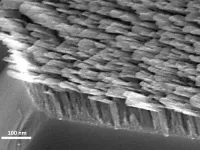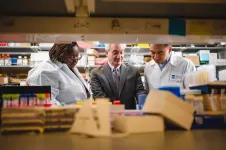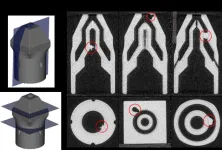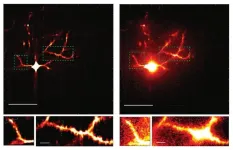(Press-News.org) The Brain & Behavior Research Foundation (BBRF) is hosting a free webinar, “Neurocognitively-Defined Subtypes in Bipolar Disorder: A Path to More Personalized Treatments” on Tuesday, June 11, 2024, at 2:00 pm ET. The presenter, Katherine E. Burdick, PhD, is the Jonathan F. Borus, MD Distinguished Chair in Psychiatry and the Vice Chair for Research in Psychiatry at Brigham and Women’s Hospital. She is the Director of the Mood and Psychosis Research Program at BWH and a Professor at Harvard Medical School. Dr. Burdick received the Colvin Prize for Outstanding Achievement in Mood Disorders Research from BBRF in 2021. The host, Jeffrey Borenstein, M.D., is the President & CEO of the Brain & Behavior Research Foundation, and host of the public television series Healthy Minds. Register today to hear their enlightening discussion on bipolar disorder.
Bipolar disorder (BD) is a mental illness that causes unusual shifts in a person’s mood, energy, activity levels, and concentration. These shifts can make it difficult to carry out day-to-day tasks. BD is a complex disease that varies notably in different patients, clinically, cognitively, and in terms of brain function. The reliance on traditional disease classifications (e.g., DSM categorical diagnoses) has yielded an incomplete understanding of the illness. To overcome this, we have applied empirical approaches to classify individuals along neurobiologically relevant dimensions into more homogenous subgroups. These novel subtypes can then be further characterized on the basis of behavioral and biological markers to identify modifiable risk factors that contribute to poor outcomes in people with BD. It is our hope that this approach will make possible a more personalized approach to treatment.
About Brain & Behavior Research Foundation
The Brain & Behavior Research Foundation awards research grants to develop improved treatments, cures, and methods of prevention for mental illness. These illnesses include addiction, ADHD, anxiety, autism, bipolar disorder, borderline personality disorder, depression, eating disorders, OCD, PTSD, and schizophrenia, as well as research on suicide prevention. Since 1987, the Foundation has awarded more than $450 million to fund more than 5,400 leading scientists around the world. 100% of every dollar donated for research is invested in research. BBRF operating expenses are covered by separate foundation grants. BBRF is the producer of the Emmy® nominated public television series Healthy Minds with Dr. Jeffrey Borenstein, which aims to remove the stigma of mental illness and demonstrate that with help, there is hope.
END
Neurocognitively-defined subtypes in bipolar disorder: a path to more personalized treatments
A free webinar from the Brain & Behavior Research Foundation
2024-06-04
ELSE PRESS RELEASES FROM THIS DATE:
Shining a light on molecules: L-shaped metamaterials can control light direction
2024-06-04
UNIVERSITY PARK, Pa. — Polarized light waves spin clockwise or counterclockwise as they travel, with one direction behaving differently than the other as it interacts with molecules. This directionality, called chirality or handedness, could provide a way to identify and sort specific molecules for use in biomedicine applications, but researchers have had limited control over the direction of the waves — until now.
Using metamaterials, a team of electrical engineering researchers from Penn State and the University of Nebraska-Lincoln ...
Wistar scientists develop novel antibody treatment for kidney cancer
2024-06-04
PHILADELPHIA — (June 04, 2024) — Advanced clear cell renal cell carcinoma (ccRCC) is a deadly form of kidney cancer with few treatment options; even with new immunotherapies, only around one in 10 patients ultimately survive.
Antibody therapies called bispecific T cell engagers (BTEs) have emerged as effective treatments for some blood cancers but have been more difficult to develop for solid tumors. While clinically successful, first-generation BTEs suffer a short half-life. Now, Wistar scientists have built upon BTE technology to develop new and improved recombinant and synthetic ...
Virus that causes COVID-19 can remain in sperm for 110 days after infection
2024-06-04
Researchers at the University of São Paulo (USP) in Brazil have shown for the first time that SARS-CoV-2, the virus that causes COVID-19, can remain in the sperm of patients for up to 90 days after hospital discharge and up to 110 days after the initial infection, reducing semen quality. The study is reported in an article published in the journal Andrology. The authors suggest that people who plan to have children should observe a period of “quarantine” after recovering ...
Researchers use machine learning to detect defects in additive manufacturing
2024-06-04
Researchers at the University of Illinois Urbana-Champaign have developed a new method for detecting defects in additively manufactured components.
One of the most important tasks in any factory is to determine whether a manufactured component is free of defects. In additive manufacturing (3D printing), it can be particularly challenging to find defects, because additive manufacturing can make components that have complex three-dimensional shapes and important internal features that are not easily observed.
The novel technology uses deep machine ...
Rare disease’s DNA-damaging mutation could have consequences for more common conditions
2024-06-04
TREX1 is a gene that is supposed to direct the maintenance of the entire body’s DNA, but new research shows that when people are born with mutated TREX1, it causes catastrophic damage to the DNA over time, resulting in a deadly rare disease called retinal vasculopathy with cerebral leukoencephalopathy (RVCL). Published in Nature Communications, the research was led by teams at the Perelman School of Medicine at the University of Pennsylvania and the Brain Research Institute at Niigata University in Japan.
While it was already known that a mutation in TREX1 was behind RVCL, the mechanism by which ...
Exploring three frontiers in marine biomass and blue carbon capture
2024-06-04
A new study offers first-time insights into three emerging climate innovations to safeguard or increase the carbon naturally captured by ocean and coastal ecosystems: rapid interventions to save the Great Barrier Reef, satellite-tracked kelp beds in the deep ocean, and seagrass nurseries in the United Kingdom. The research, published in Environmental Science & Policy and co-authored by leading climate scholars at Boston University, Aarhus University, and the University of Sussex Business School, advances knowledge of understudied interventions in marine ...
Microscope system sharpens scientists’ view of neural circuit connections
2024-06-04
The brain’s ability to learn comes from “plasticity,” in which neurons constantly edit and remodel the tiny connections called synapses that they make with other neurons to form circuits. To study plasticity, neuroscientists seek to track it at high resolution across whole cells, but plasticity doesn’t wait for slow microscopes to keep pace and brain tissue is notorious for scattering light and making images fuzzy. In a paper in Scientific Reports, a collaboration of MIT engineers and neuroscientists describes a new microscopy system designed for fast, clear, and frequent imaging of the living brain.
The system, ...
VHIO researchers demonstrate the utility of high-sensitivity liquid biopsy to predict and monitor response to immunotherapy
2024-06-04
The liquid biopsy technique applied in this work is based on the sequencing of the entire tumor genome from 138 patients and the monitoring of mutations in the blood. This approach achieves high sensitivity in detecting the tumor signal in the blood (1/1,000,000 DNA molecules), and the patterns found reflect how patients respond to immunotherapy.
This study is part of the Comprehensive Program of Cancer Immunotherapy and Immunology (CAIMI) at VHIO, funded by the BBVA Foundation, and is co-led by Dr Rodrigo Toledo, head of the Biomarkers and Clonal Dynamics Group at the Vall d’Hebron Institute of Oncology (VHIO), ...
Muscle disorder caused by key protein mutations uncovered in new study
2024-06-04
A recent study has found that the SMCHD1 protein plays a key role in controlling how genes are processed, which affects the progression of Facioscapulohumeral Muscular Dystrophy (FSHD). This discovery about SMCHD1's function in gene regulation is important because it opens new possibilities for developing targeted therapeutic strategies to combat the disease. By understanding more about how SMCHD1 works, scientists can explore new ways to fight the disease.
A recent study by MD-PhD student Eden Engal under the guidance of Dr. Yotam Drier and ...
Observing ultrafast photoinduced dynamics in a halogen-bonded supramolecular system
2024-06-04
Researchers uncover how the halogen bond can be exploited to direct sequential dynamics in the multi-functional crystals, offering crucial insights for developing ultrafast-response times for multilevel optical storage.
Halogen bonds are intermolecular interactions that arise from the attraction between a halogen atom (group 17 elements in the periodic table) and another atom with lone pairs, more generally a molecular entity with high electron density. Understanding the distinctive and highly directional nature of halogen bonds is crucial for crystal engineering and studying ...
LAST 30 PRESS RELEASES:
ASU researchers to lead AAAS panel on water insecurity in the United States
ASU professor Anne Stone to present at AAAS Conference in Phoenix on ancient origins of modern disease
Proposals for exploring viruses and skin as the next experimental quantum frontiers share US$30,000 science award
ASU researchers showcase scalable tech solutions for older adults living alone with cognitive decline at AAAS 2026
Scientists identify smooth regional trends in fruit fly survival strategies
Antipathy toward snakes? Your parents likely talked you into that at an early age
Sylvester Cancer Tip Sheet for Feb. 2026
Online exposure to medical misinformation concentrated among older adults
Telehealth improves access to genetic services for adult survivors of childhood cancers
Outdated mortality benchmarks risk missing early signs of famine and delay recognizing mass starvation
Newly discovered bacterium converts carbon dioxide into chemicals using electricity
Flipping and reversing mini-proteins could improve disease treatment
Scientists reveal major hidden source of atmospheric nitrogen pollution in fragile lake basin
Biochar emerges as a powerful tool for soil carbon neutrality and climate mitigation
Tiny cell messengers show big promise for safer protein and gene delivery
AMS releases statement regarding the decision to rescind EPA’s 2009 Endangerment Finding
Parents’ alcohol and drug use influences their children’s consumption, research shows
Modular assembly of chiral nitrogen-bridged rings achieved by palladium-catalyzed diastereoselective and enantioselective cascade cyclization reactions
Promoting civic engagement
AMS Science Preview: Hurricane slowdown, school snow days
Deforestation in the Amazon raises the surface temperature by 3 °C during the dry season
Model more accurately maps the impact of frost on corn crops
How did humans develop sharp vision? Lab-grown retinas show likely answer
Sour grapes? Taste, experience of sour foods depends on individual consumer
At AAAS, professor Krystal Tsosie argues the future of science must be Indigenous-led
From the lab to the living room: Decoding Parkinson’s patients movements in the real world
Research advances in porous materials, as highlighted in the 2025 Nobel Prize in Chemistry
Sally C. Morton, executive vice president of ASU Knowledge Enterprise, presents a bold and practical framework for moving research from discovery to real-world impact
Biochemical parameters in patients with diabetic nephropathy versus individuals with diabetes alone, non-diabetic nephropathy, and healthy controls
Muscular strength and mortality in women ages 63 to 99
[Press-News.org] Neurocognitively-defined subtypes in bipolar disorder: a path to more personalized treatmentsA free webinar from the Brain & Behavior Research Foundation







